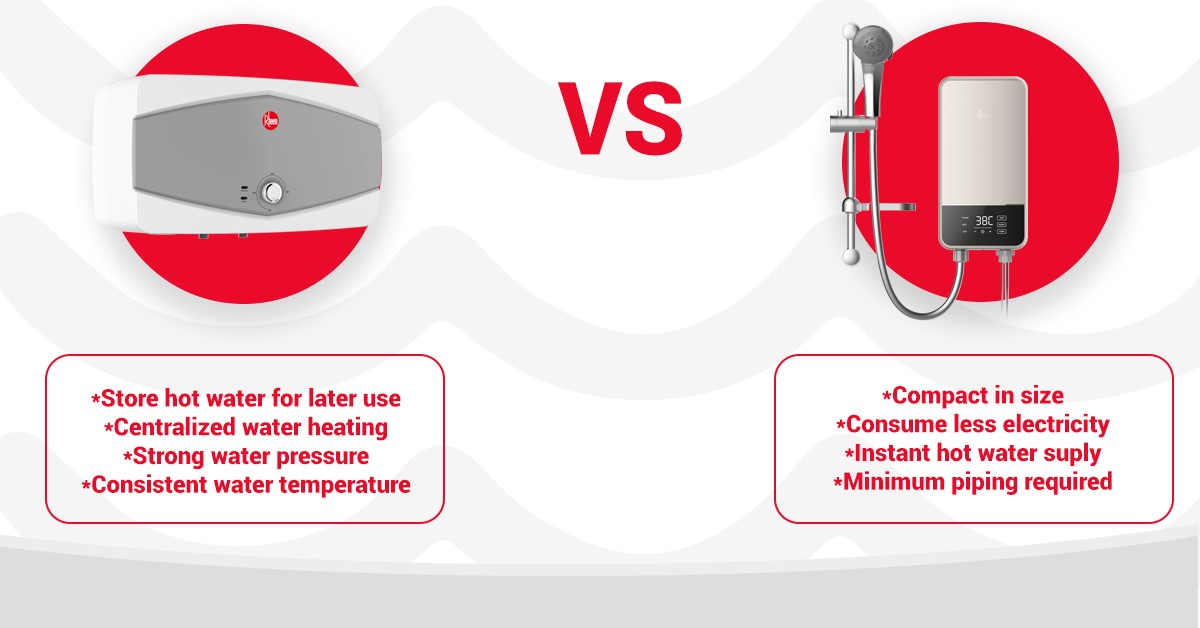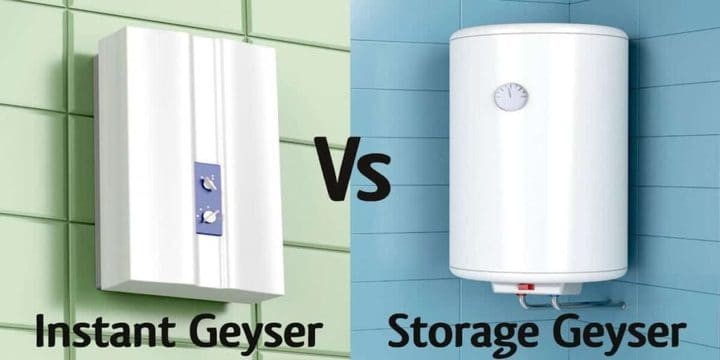Instant water heaters provide hot water on demand, while storage water heaters store a specific amount for later use. The choice depends on your hot water needs and available space.
Choosing between instant and storage water heaters can significantly impact your home’s energy efficiency and convenience. Instant water heaters heat water as you need it, making them ideal for smaller households or those with limited space. On the other hand, storage water heaters maintain a reservoir of hot water, suitable for larger families or high-demand situations.
Understanding the differences helps you make an informed decision tailored to your lifestyle. Consider factors like energy consumption, installation costs, and maintenance requirements to find the best option for your home. The right choice can enhance your comfort and reduce utility bills.
Page Contents
- 1 Introduction To Water Heaters
- 2 Key Differences Between Instant And Storage Heaters
- 3 Pros And Cons Of Instant Water Heaters
- 4 Pros And Cons Of Storage Water Heaters
- 5 Installation And Maintenance Considerations
- 6 Energy Efficiency And Eco-friendliness
- 7 Choosing Based On Household Size
- 8 Financial Implications Over Time
- 9 User Experiences And Reviews
- 10 Conclusion: Making The Informed Decision
- 11 Frequently Asked Questions
- 12 Conclusion
Introduction To Water Heaters
Instant water heaters provide hot water on demand. They heat water directly without storing it. This type is great for small spaces. It saves energy and reduces costs.
Storage water heaters store hot water in a tank. They keep water heated until needed. This option is suitable for larger households. It can provide hot water for multiple uses at once.
| Feature | Instant Water Heater | Storage Water Heater |
|---|---|---|
| Heating Method | On demand | Stored water |
| Energy Efficiency | Higher | Lower |
| Installation Space | Less required | More required |
| Hot Water Supply | Unlimited | Limited by tank size |
Key Differences Between Instant And Storage Heaters
Instant heaters provide hot water instantly. They heat water on demand. This means no waiting time. On the other hand, storage heaters keep water hot in a tank. They take time to heat the water before use.
Capacity varies between both types. Instant heaters are usually small and compact. They can supply hot water for one tap at a time. Storage heaters can hold large amounts of water. They are suitable for bigger households.
| Type | Heating Time | Capacity |
|---|---|---|
| Instant Heater | Immediate | Single tap use |
| Storage Heater | Time required | Multiple taps |
Pros And Cons Of Instant Water Heaters
Instant water heaters are very space-efficient. They take up less room than storage models. This makes them great for small homes.
Energy consumption is another key point. Instant heaters only use energy when needed. This can lead to lower energy bills over time.
The initial cost of instant water heaters is often higher. However, their long-term savings can make up for this. They are a good investment for many families.
Pros And Cons Of Storage Water Heaters
Storage water heaters can last up to 15 years. Regular maintenance helps increase their lifespan.
They provide a large amount of hot water. This makes them great for big families. Hot water is available whenever needed.
Operating costs are usually lower than instant heaters. They heat water in bulk, which is efficient. However, energy bills may rise if used excessively.
Installation And Maintenance Considerations
Installing an instant water heater is often quick and easy. It usually requires a professional to ensure proper setup. Storage water heaters need more space and proper plumbing adjustments. Make sure to choose a location that is accessible for maintenance.
Maintenance for both types varies. Instant heaters need less upkeep. Regularly check for mineral build-up. Storage heaters require checking the anode rod. This rod prevents corrosion and extends the heater’s life.
Proper draining of the tank is essential for storage heaters. Cleaning the filters in instant heaters can improve efficiency. Routine checks ensure both systems work well and last longer.

Credit: www.rheemasia.com
Energy Efficiency And Eco-friendliness
Energy ratings help consumers choose the most efficient water heater. They show how much energy the heater uses. A higher rating means better efficiency and lower energy costs. Look for the Energy Star label for eco-friendly options.
The environmental impact of water heaters varies. Instant heaters use less energy overall. They heat water only when needed. Storage heaters keep water hot, even when not in use. This can lead to wasted energy.
| Type | Energy Efficiency | Environmental Impact |
|---|---|---|
| Instant Heater | High | Lower emissions |
| Storage Heater | Moderate | Higher emissions |
Choosing Based On Household Size
Instant water heaters are perfect for singles and couples. They provide hot water on demand. No need to wait for a tank to fill. This saves energy and reduces costs.
Storage water heaters work best for families. They can hold a large amount of water. This means everyone can enjoy hot showers at the same time. They are great for busy mornings.

Credit: www.aosbath.com
Financial Implications Over Time
Instant water heaters often have higher upfront costs than storage models. They save money over time through energy efficiency. Storage water heaters cost less initially but may lead to higher bills. Choosing the right type can impact long-term savings.
Resale value can also vary between the two types. Homes with instant water heaters may attract more buyers. They offer modern features that many prefer. Storage heaters can appeal to buyers seeking lower initial costs.
| Type | Upfront Cost | Long-Term Savings | Resale Value |
|---|---|---|---|
| Instant Heater | Higher | Better | More Attractive |
| Storage Heater | Lower | Less Efficient | Moderate Appeal |
User Experiences And Reviews
Many users prefer instant water heaters for their efficiency. They heat water on demand. This means you only heat what you need. Users enjoy the lower energy bills associated with this type.
Storage water heaters, on the other hand, are popular for their large capacity. Families appreciate having a constant supply of hot water. These heaters can serve multiple taps at once.
| Type | User Feedback |
|---|---|
| Instant Heater | Efficient, saves energy, compact. |
| Storage Heater | Reliable, good for large families, higher energy costs. |
Market trends show a rise in instant heater popularity. Many households are switching to this modern option. It fits well in smaller spaces and saves time.
Storage heaters still hold a significant market share. They cater to users needing consistent hot water for daily activities. Both types have their loyal fans.
Conclusion: Making The Informed Decision
Choosing between an instant and storage water heater depends on your specific needs. Think about how much hot water your household uses daily. Instant heaters provide hot water on demand. They are great for smaller homes or apartments. On the other hand, storage heaters can supply a large amount of hot water at once.
Consider the energy efficiency of both types. Instant heaters often use less energy. This can lead to lower electricity bills. Storage heaters might save money upfront but can cost more in the long run.
Lastly, think about installation and maintenance. Instant heaters are usually easier to install. Storage heaters may require more space and more frequent maintenance. Weigh these factors to make an informed choice.

Credit: www.linkedin.com
Frequently Asked Questions
Which Is Better Instant Heater Or Storage Heater?
Instant heaters provide hot water on demand, making them energy-efficient for smaller households. Storage heaters store water for later use, ideal for larger families needing a steady supply. Choose instant for convenience and savings, or storage for consistent availability. Your choice depends on your household’s specific needs.
Is Tankless Water Heater Better Than Storage Water Heater?
Tankless water heaters provide on-demand hot water, saving energy and space. They typically last longer than storage water heaters. However, initial costs are higher. Choose based on your household’s hot water needs and budget for the best option.
What Is The Major Drawback To Storage Water Heaters?
The major drawback of storage water heaters is their limited hot water supply. Once the stored water runs out, users must wait for it to heat again. This can lead to inconvenience during peak usage times, especially in larger households.
Energy inefficiency is another concern, leading to higher utility bills.
What Are The Downsides To A Tankless Water Heater?
Tankless water heaters can have higher upfront costs. They may struggle to supply enough hot water for multiple uses simultaneously. Installation can be complex and may require upgrades to existing systems. Maintenance can be more frequent, and they might not perform well in extremely cold climates.
Conclusion
Choosing between an instant and storage water heater depends on your needs. Instant heaters offer on-demand hot water, saving space and energy. Storage heaters provide a ready supply for larger households. Consider factors like efficiency, installation, and budget. Making an informed choice will enhance your comfort and satisfaction with your hot water system.
